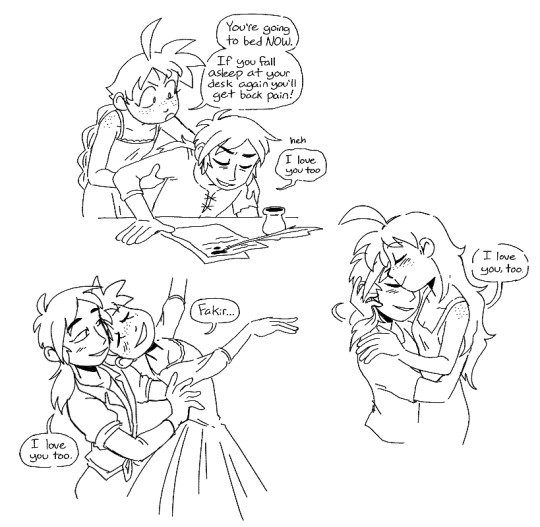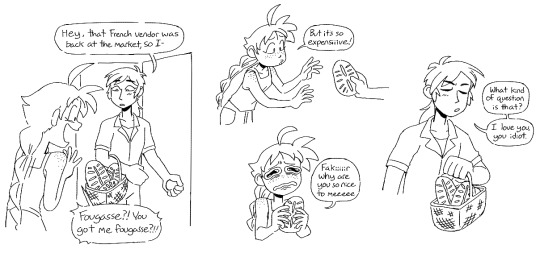#and it's because of drosselmeyer that she was ever human in the first place so i can see them being nervous about it
Text


even after settling down, theyre pretty cautious.....




.......it doesnt last long
#princess tutu#princess tutu spoilers#ahiru#fakir#fakiru#art tag#my anime straight couple ever. nobody is doing it like them#anyway i know theres not a lot of reasons to think the 'confessing love = disappearing' rule still applies post-canon#but ahiru being human again necessitates that there are still reality-warping powers at work#and it's because of drosselmeyer that she was ever human in the first place so i can see them being nervous about it#also this is an aside but i picture after fakir writes ahiru back into a girl they kinda have to flee gold crown town#to avoid fakir getting his hands chopped up by cultists and everything yknow#they settle down somewhere else in the german countryside with a little village nearby and have a simple life#ahiru keeps practicing ballet and fakir keeps writing and theyre happy :)
2K notes
·
View notes
Text
I was today years old when I finally learned that the word “tutu” actually originates in the early 20th century, and wasn’t some kind of coevolution with the entirety of 19th-century ballet as I’d vaguely assumed.
Specifically, Etymonline (by far the online source I consider most trustworthy for this kind of research) gives the first usage of the word as 1910; Merriam-Webster gives it as 1913. Other sources, such as the Macmillan Dictionary blog and the Oxford Languages result that typically pops up if you Google something like “X etymology” give the the first appearance of the word as simply “early 20th century,” insofar as it refers specifically to the skirt worn by a ballerina.
(The Wikipedia page for “Tutu (clothing)” gives the earliest recorded usage as 1881, but that date has no citation and appears nowhere else I’ve been able to look, so I’m disinclined to give it any merit. And, frustratingly, Apollo’s Angels by Jennifer Homans, an otherwise excellent history of ballet, for some reason skips over the origin of the word “tutu” entirely; so unfortunately I can’t appeal to non-digital resources for clarification.)
This would ordinarily be just a fun little bit of trivia, but in the context of Princess Tutu it brings up some Interesting implications. Like, this means that in order to have a character named “Princess Tutu,” and for that name to automatically conjure in the public consciousness images of a ballerina in a frilly skirt, Drosselmeyer couldn’t have begun writing The Prince and the Raven any earlier than 1910.
Among other things, this indisputably puts the anime as technically happening in the “modern day” (sometime between the mid-1990s and the 21st century aughts, depending on how you measure) --- it kind of has to, for Drosselmeyer to have been writing that late and still be four or five generations distant from Fakir. Especially since the age of marriage (and presumably occurrence of first legitimate offspring) rose throughout the 19th century, the time period in which Drosselmeyer would’ve been born and probably lived the majority of his years. Looking at all states in 19th-century Germany, as in this JSTOR article, in 1867 an average of about 74% of men who married at all did so between the ages of 30 and 39, rising to nearly 77% in 1871, then to a little over 81% in 1880; the numbers for women in that same age bracket kept pace, though the percentage of them represented in later marriage seems to consistently stayed a little bit higher.
So the old-timey storybook aesthetic seen throughout the show isn’t any indicator of when the anime takes place, so much as simply the “look” of the Story as dictated by Drosselmeyer. An out-of-time fairytale town, the perfect stage for any number of tales he might spin.
More interestingly, this means that Drosselmeyer would’ve been writing his final work either in the years just preceding World War I, or perhaps during the war itself. Even before that, around the turn of the 20th century, the world of German art (theatrical and literary) had been enamored of tragedy and violence, as Barbara Tuchman expounds on in her thorough and compulsively readable book The Proud Tower: A Portrait of the World Before the War, 1890 - 1914 (though it should be noted that by “world” she’s mostly referring to Britain, France, Germany, America, and the Hague): “Tragedy was the staple of the German theatre [...] Death by murder, suicide or some more esoteric form resolved nearly all German drama of the nineties and early 1900′s.”
So, if writing before the War, Drosselmeyer would have been surprisingly in line with the zeitgeist of the nation. At the very least, I think it’s safe to say that his brand of storytelling was a solid fit for the time period. And the specification of “theatre” isn’t a dealbreaker, since many a writer of short stories and novels also dabbled in playwriting, and vice versa --- Oscar Wilde is the immediate example that jumps to mind. Not to mention that Drosselmeyer himself seems to have something of a preoccupation with theatre in the broad sense, what with all those puppets. We’re never given enough information about his oeuvre to definitively conclude whether or not he ever wrote for the theatre or was acquainted with anyone who did, but in any case it’s not a far leap to posit that the prevailing aesthetic of the stage likely influenced and informed what went on the page.
If he was writing The Prince and the Raven during World War I, though, we must enter the realm of the more purely speculative (though that is half the fun of applying Real World History to something like this). We know that Drosselmeyer was killed because the Bookmen, as well as various people who had apparently once come to him to have stories of wealth and power spun for them (“the nobles” in particular are mentioned, which I find interesting), feared that he would use his power to create a great tragedy that would sweep them all along in its destructive wake. Now, on the one hand, it probably only takes five minutes of talking to the guy to figure out that he doesn’t exactly have humanity’s best interests at heart, so their conclusion didn’t really need much in the way of supporting evidence. On the other hand, World War I was itself a tragedy in every sense, and a brutal one at that; which tore a great rift between the Old World and the Modern World with such unimaginable violence that the world was irrevocably and forever changed by the trauma of it.
While I doubt that any of the Bookmen or others would have necessarily thought Drosselmeyer responsible for the conflict --- even his considerable story spinning powers could alter reality significantly only in one small town, plus he seems just plain uninterested in “realistic” storytelling devices and genres --- I wouldn’t be surprised if they were all suddenly keenly aware of how he might take advantage of it to craft even more gruesome tragedies of his own. That realization and paranoia, combined with the ever-mounting cost of the war in terms of both resources and human lives, could have been the catalyst that pushed these people to act to decisively against the possible threat that Drosselmeyer represented. Indeed, it might also account for the cruelty of the execution, the impotent brutality of the wider war finding its local synecdoche in a mob removing the hands of a dangerous individual, but not the head. (Although, that’s also assuming that Drosselmeyer didn’t just find out about the Bookmen’s plan and use his spinning to manipulate them into performing an “execution” that would give him time for the whole writing-in-blood thing --- but that’s going from simple speculation to wild speculation, so I’ll leave that be for now.)
In any case, looking at all of this evidence across history and culture, I feel relatively safe in stating that Drosselmeyer likely wrote The Prince and the Raven, and of course died, sometime between 1910 and 1918. (There might also be something to be said about a possible connection between his mechanical clockwork pocket dimension and the emergence of mechanized warfare during WWI as well, I think, but the idea isn’t fully formed and I’ve already gone on long enough as is.) I might even go so far as to shorten the time frame to no later than 1917 --- that would still allow for the conclusion of 1916, the year that saw the battles of both the Somme and Verdun, two of the most infamously bloody battles of World War I (which would certainly have an effect on the psyches of the general population, and specifically certain individuals who were already fearful of tragedy befalling them). Hell, maybe even smack-dab in the middle of 1916, it certainly would’ve been stressful enough.
Regardless, it’s strange and a little exciting to have identified a more or less precise time period for the writing of The Prince and the Raven, and all thanks to looking up the history of a single related word.
#princess tutu#my writing#meta#historical context#oh god i just put drosselmeyer in historical artistic context#oh fuck i have Sources supporting my claims#do you ever set out to share a short tidbit of mildly interesting info and end up writing the rough outline of an academic essay?#this is how my mind works someone please either stop me or pay for me to go back to college
17 notes
·
View notes
Text

novaiiiiiiume
replied to your post
“I wanna write stuff while I’m working on the house. Give me the...”
LOHENTUTU
PLEASE
GHOSTIES MEETING THE SQUAD
If that’s ok
Wow, this took longer than I meant to for a number of reasons, but I couldn’t resist doing this! Although I took it in a bit of a different direction. What can I say? Plot bunny latches on, you don’t let plot bunny go.
The three sit around the ancient, ornate spirit board on the floor of Autor’s recreation of Drosselmeyer’s study. It’s a gorgeous little antique, nothing like the mass-produced spirit boards available at the toy store nowadays. The heavy wooden board pivots and unfolds over its storage compartment. Within are a couple of planchettes with fine crystal windows to magnify the beautifully inked letters, numbers, and words. Holding it feels the way old books smell, which isn’t too unusual since it’s spent most of its life in a library.
“Of all the things for my family to have and me not know about it,” Autor grouses as he places the planchette on the board.
Erina teasingly smiles and says, “Accept that your reputation as the weird occult kid is fully warranted.”
Autor harrumphs. Erina shrugs.
Fakir crosses his arms and goes, “This seems pointless. Whatever’s haunting me has done it the most at my house.”
“It’s not my fault I’m allergic to your pet duck,” Autor says.
“Besides, whatever it is followed you to class,” Erina points out. “You said you heard it call out to you. It’s looking for you specifically.”
Fakir looks to his... well, friends might be strong. Work associates isn’t quite accurate, either. Humans he can somewhat rely on that aren’t in a story. He and Erina are agreeable enough company, so she’ll come along no matter what. However, he needs Autor to cooperate since he’s the one who owns the spirit board and knows how it works. No other options left, Fakir unfolds his arms and places his fingers on the planchette. The others follow suit and proceed to open the board.
“Is anyone here?” Fakir asks.
The planchette stays still between the three.
“Has someone been trying to contact me?” Fakir asks, undaunted.
Autor sneezes, and the planchette twitches.
“That doesn’t count,” Erina says.
“I wasn’t trying to make it move,” Autor grumbles through his handkerchief.
The planchette twitches again.
“Have you been trying to contact me?” Fakir presses.
The planchette practically jumps out of their hands, leaping to YES.
“Now you’re just teasing him,” Autor says, glaring at Erina.
“Oh, great way to cover up your acting,” Erina quips.
Fakir shushes them. “Neither of you are in on it. I’m not even in on it! That’s the whole point.”
“Then one of us should ask a question,” Erina says, indicating herself and Autor.
“Who are you, spirit?” Autor asks, getting them back on track.
The planchette slips down to the letters T and U only to repeat them.
Erina rolls her eyes. “Are you kidding? We’re playing fairy tale games? This is the worst Halloween party I’ve ever been to.”
“Now, now, what if it’s a demon pretending to be Princess Tutu?” Autor sarcastically suggests.
Something in Autor’s voice prickles Fakir. It carries just a bit more of Drosselmeyer’s sadistic glee than he’s comfortable with. That’s the last thing any of them need in this place. Fortunately, his question comes with a relatively simple answer.
“We ask a question only Tutu or someone close to her would know the answer to,” Fakir suggests.
Autor and Erina stare at Fakir like he’s grown two extra noses.
“Well, that should be really simple for anyone who’s read The Prince and the Raven to answer, which is almost everyone!” Autor protests.
But Fakir shushes him again. “Not unless they know the ending.”
“A trick question, then?” Erina asks. “Fakir, no one knows the ending. Drosselmeyer died before it was finished.”
Fakir sighs in exasperation and goes, “Look, however skeptical all three of us are, both of you trusted me far enough to actually sit with me around a spirit board. Trust me on this question.”
“Fine,” Autor grumbles.
“All right,” Erina agrees, resigned.
Fakir takes a breath to calm himself, closes his eyes a moment, and asks, “Tutu, where did the Prince hold you in his heart? Which shard did you manifest in?”
The planchette smoothly glides about to spell the answer:
H
O
P
E
Fakir nods, satisfied with this answer.
“Seriously?” Erina asks.
He shrugs and confirms, “It’s the right answer.”
“And you’re absolutely certain about this?” Autor presses.
“I could ask her another question, but I don’t know if that’s necessary,” he says. “Depending on what she wants, that is.”
“What do you want, Tutu?” Erina asks, directed to the spirit board this time.
L
O
H
E
N
G
R
I
N
“The Knight?” Autor wonders. “Why do you want him?”
S
E
A
R
C
H
“Wait,” Fakir says. “That might be it. Tutu and Lohengrin looking for each other in the hereafter. The voice I heard in class was too deep to be Tutu, but the noises I’ve heard at home sound like pointework.”
“So, what, you just run the personals for the dead now?” Erina jabs.
“You’re right here in the news room with me,” Fakir responds.
Autor holds back a snicker, but he sobers up enough to go, “So what’s the problem? They have you as a connection. Shouldn’t they be able to meet now?”
The planchette moves again to answer:
C
A
N
T
S
P
E
A
K
Erina sits back a bit and goes, “Wow. That’s kind of cruel.”
“Yeah,” Autor agrees. “Isn’t that always the thought, that you’d be reunited with your dead loved ones in the afterlife?”
“Maybe they couldn’t since Lohengrin died but Tutu vanished,” Fakir speculates.
The planchette moves again:
V
E
S
S
E
L
The three let the word sink in, the reality of what they might have to do weighing them down inside. All Lohengrin and Tutu want is a night of reunion, but at the cost of two of their three consciousnesses for the duration? And if they don’t, the two are going to keep haunting Fakir.
“We could’ve had a normal Halloween party,” Erina half-laments. “We could’ve watched some scary movies and sneak beer out of the fridge like normal teenagers. But instead we’re gonna get possessed by ghosts.”
“Now hold on, we haven’t agreed to anything yet,” Autor says. “And I for one am not giving up my body to some random spirit that might be Lohengrin or Tutu unless I’m absolutely sure it’s not going to cause any harm.”
Fakir takes a deep breath and goes, “I can make sure nothing bad happens. But if I do that, I can’t be one of the vessels.”
“That’s easy for you to say!” Erina protests. “You’re not taking that kind of risk!”
“Erina,” Fakir says, voice as serious as she’s ever heard him get. “It’s not without risk for me, but the risk is lower for all of us if we follow this plan.”
Erina harrumphs, but it doesn’t have the same weight to it, and asks, “And what is your plan?”
“I’m going to write a story.”
Erina downright glares at him, but Autor jolts back and asks, “Are you kidding me?!”
“No.”
Autor runs his hand over his face. “You’re a Spinner?! You?!”
“You’re asking questions in the right tone, but you’re asking the wrong questions!” Erina shouts at Autor. “What is a Spinner and how is writing a story of all things supposed to protect us in case this turns into The Exorcist?!”
“I’ll explain everything later, but we should do this now if we can,” Fakir says.
“No, you won’t explain everything later because we shouldn’t explain it to her!” Autor yells, pointing accusingly at Erina.
“No! If I’m involved in it, I need to know at some point! You have no right to keep it from me!” Erina yells back.
“Would you two please be quiet?” Fakir hisses. “Look, if it doesn’t work, then the worst case scenario is I’m writing a story that will do nothing and both of you will be fine. You have nothing to lose.”
“Except our consciousnesses,” Autor says.
“For a night. That’s all. Whatever needs to be done, we’ll get it done tonight.���
“Hmph. Can we at least read the story in the morning?” Erina asks. “I might as well find out what happens to my body while someone else uses it.”
“Yes, I’ll agree to this if we can read the story tomorrow,” Autor agrees.
“Fine,” Fakir says, going along with the compromise.
“Fine,” Erina agrees.
“Fine,” Autor agrees.
And with that, the three close the board.
Lohengrin gasps a deep breath and feels at his chest for his mortal injury. He shakes and laughs, the glasses on his face blocking his hands from wiping away his tears. He takes them off, looks at the blurry room, and puts them back on.
“Lohengrin?”
He recognizes the voice even though he shouldn’t. “Tutu? Tutu, is that you?”
Tutu tucks her long hair behind her ears and nods. “I think so.”
Lohengrin crosses the short distance and grabs her hands with his, their fingers clumsily knitting together. Their foreheads touch, and they both laugh in breathless disbelief.
“It has been eons,” he tells her.
“I didn’t imagine Heaven to be a place to wait,” she responds.
“It’s been eons if it’s been a moment,” Lohengrin says, squeezing their joined hands. “I can’t count all of my days in what should be paradise spent thinking on when you would come, even if my heart was glad that you were with the Prince.”
She ducks her head down with a sniffle. “He’s finally whole and at peace. He’s with his Princess. And... and I’ve missed you more than I’ve known!”
Tutu takes her hands back and embraces Lohengrin as tight as her body allows, glad when he does the same and rests a hand on the back of her head.
“Has the time finally come?” Lohengrin asks her. “Can you join us?”
“I think so. I hope so. I believe the time has come now that the Prince’s heart is whole and not in danger of shattering again.”
He kisses her forehead and says, “You’ve done what I couldn’t, Tutu. And once you are there, Heaven will finally be complete.”
Tutu looks up and asks, “Will you stay with me until the dawn, Lohengrin?”
“Of course, of course,” he assures her, rubbing his thumbs along her tears’ trails. “We can cross it together.”
Of the three, Autor’s the first to wake up in the late morning.
He rubs the drowsiness from his eyes and tries to stretch out of his uncomfortable sit-sleep position only to find he’s holding hands with Erina. She’s in a state similar to his own pre-waking moments, the only difference being her head leaning against his shoulder. He opens his hand to let go of hers, but their fingers remain loosely knitted. He gently sets to work undoing her fingers, checking the both of them over for anything amiss. They seem no worse from the night, no strange marks or unusually mussed clothes.
Fakir sleeps slumped over the desk, some pages of parchment by his elbow.
The story.
Autor swallows, hands already trembling in anticipation. A story written by a Spinner in this very study. And he’s part of it, however small of a part he played. He quietly steps over and looks at the page on top, carefully taking it from the pile. He steadies himself with a breath, bracing himself to read.
“...eventually the Princess nodded off to sleep, her head resting on the Knight’s shoulder. She trusted in his promise that they would make the final journey together. Her time to guide others had come to an end, and the Knight would take his turn to guide her to the Heaven she’s dreamed of for so long.”
Did they just fall asleep while Fakir wrote his story? That’s all this seems to be, and yet the words plant an ache in Autor’s heart.
“Autor?”
He looks to Erina when she calls, possibly the first time either of them have used their proper names since this started. She gets to her feet with a yawn, stretching her arms over her head, and joins him by the desk.
“Is this the story?” she asks.
“Yeah,” he answers, passing her the page in his hand.
Erina takes it and quietly reads, making a soft little sigh when she reaches the end. She places the page back with the others, careful not to disturb Fakir.
“Should we wake him?” she asks.
Autor shrugs and goes, “Maybe we should just let him sleep.”
Erina nods. “Well, that was a Halloween party I won’t forget anytime soon.”
“Yeah...”
“Let’s just watch scary movies at the next one.”
#Princess Tutu: I might need my notes for this...#novaiiiiiiume#it's NOT in my Variations/Adaptations universe for once!#which means this is the first time Autor and Erina meet in this telling#look you didn't say which squad!#but man Fakir is kind of lonely#spirit board#I got it going really good and then realized what I was writing wouldn't work#that turned into 'FUCK!' *flips a coffee table*#okay it's 1:22 in the morning for me and I'm actually satisfied with this so here we go#except I probably actually will just put this in a queue because yeah
33 notes
·
View notes